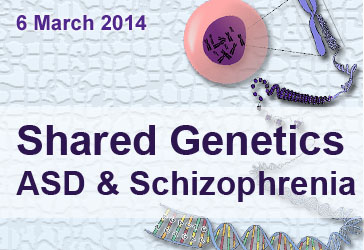Check out other stories from the Latest News
Shared Genetics: ASD and Schizophrenia
By Eric Larsen, Ph.D. on March 6, 2014

Background: New high-throughput sequencing technologies are providing unprecedented view of the human genome. Exome sequencing—a method targeting the protein-coding part of the genome—is increasingly used to unravel genetic underpinnings of common, complex disorders such as autism and schizophrenia.
What’s new: In the February 13, 2014, issue of Nature, two studies reported mutations identified in exomes of large cohorts of individuals with schizophrenia and a control population. The first study analyzed rare, disruptive mutations in the protein-coding regions of approximately 2,500 genes previously implicated in schizophrenia. The team evaluated DNA of 2,536 schizophrenia cases and 2,543 healthy individuals. The second study analyzed the exomes of 600 schizophrenia trios (affected individuals along with their parents). Both studies found mutations distributed across many genes; many of these genes share function at the neuronal synapse—where two neurons communicate. Of particular importance, the authors demonstrated that the schizophrenia-associated genes identified in their studies overlapped with autism-associated genes.
Why it’s important: These findings illustrate that many rare mutations contribute to schizophrenia. Furthermore, genes enriched in a number of critical cellular pathways active at the neuronal synapse are preferentially targeted by rare disruptive mutations in schizophrenia. A shared genetic architecture between schizophrenia and other neurodevelopmental disorders is becoming evident.
Help me understand :
| Source(s) : |
| Tweet |

